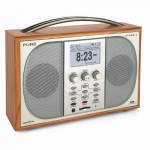I was talking to a colleague over a lugubrious coffee recently – it happens – and we came to the conclusion that broadcasting music can be a dangerous thing. You see, when programmes such as Radio 3 play music, there’s a dangerous assumption that what’s being broadcast is automatically good, simply because it is being played on the radio. Lazy listeners to Radio 3 and Classic FM can easily assume that what they are hearing must be of a suitable standard, otherwise it wouldn’t be aired.

The same danger lurks around the printed word: readers assume that, if something is typed, or printed, it Must Be So. Newspapers have an aura of omniscience as a result of this. Wikipedia seems to thrive on this assumption, and how many people have taken Wikipedia’s information as factually correct, when it often isn’t ?
I’ve heard some pretty terrible performers on the radio: soloists with otherwise eminent, reputable period-instrument ensembles, whose performing I wouldn’t even sit through if they turned up at the local community hall. There’s a sense that the performance is condoned by the broadcasting company in the act of putting the music on the air: as though the act of broadcasting confers some seal of approval on it.
As listeners, we need to be wary of accepting that performances we hear on the radio, or sometimes see on television, are acceptable (I hesitate to use the word ‘good’ here, as the judgement of one person may not be that of another: but we can all at least (I hope) distinguish between performers who are in tune, or engaging, and those that simply are not). We are often too passive as cultural consumers, reaching readily for newspaper reviews to tell us what concerts are ‘worth’ attending, what art exhibitions are ‘worth’ visiting, what films are ‘worth’ seeing.
It’s time we listened (and watched) more pro-actively; time we stopped believing in the benign, assumed sanctioning by radio and television of mediocre, even bad music-making, and started making cultural decisions for ourselves.

It’s not just what is broadcast that is an issue. The medium itself is under attack from the implementation of new technology by the BBC. DAB radio is seen by the BBC as a method of packing as many channels as possible into its allocated bandwidth. At best Radio 3 is allocated 192Kbs which is just about acceptable for high quality music but way below the quality level of CD or good reception FM Radio.
Frequently this drops to 128Kbs when Radio 5 live has a big sporting event on.
So even if you do get a decent performance I wouldn’t recommend listening on DAB. However we may have no choice in future as the government wants to auction off the FM bandwidth.
I’ve written an assignment on this subject, it’s a bit technical but it explains the paradox of why a good technical advance has been perverted in its implementation.
The assumption of the BBC is that if mp3 quality is good enough for the majority (as proved by the adoption of downloads etc) then it’s good enough for everyone.
Interesting website, and post topic! Mediocrity seems to make its way into TV, print, the Web and radio via politics, connections, plain old luck, and marketing abilities. A book publisher once told me authors sometimes get selected based on their marketing abilities rather than their actual writing skills. The same could probably apply for any trade, including musicians.
‘No one ever went broke underestimating the taste of the American public.’
H.L .Mencken